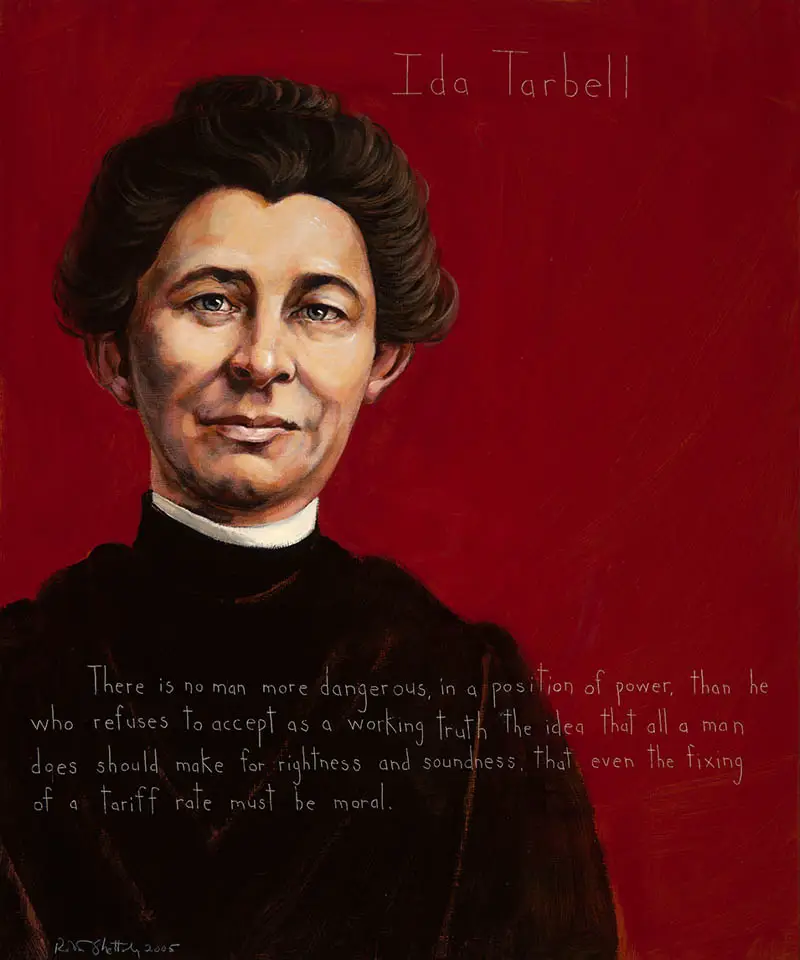
Ida Tarbell
Ida Tarbell
Investigative Journalist, Author : 1857-1944
“There is no man more dangerous, in a position of power, than he who refuses to accept as a working truth that all a man does should make for rightness and soundness, that even the fixing of a tariff rate must be moral.”
Biography
At the end of the 19th century, when most women stayed at home, Ida Tarbell went to work. Most working women in those days were nurses or teachers, so she tried teaching briefly, but she ended up as a writer. Back then, the few women in media handled the society pages, but Tarbell had other ideas. Along with a few male colleagues, in a group that collectively became known as the muckrakers, she emerged as one of America’s earliest and finest investigative reporters.
Tarbell was born in western Pennsylvania, where — the only woman in the class of 1880 — she received A.B. and M.A. degrees from Allegheny College. In 1891 she moved to Paris, continuing her studies at the Sorbonne while supporting herself as a journalist. Three years later, back in America, she was approached by the editor S. S. McClure, who asked her to write about Napoleon for his eponymous magazine.
Tarbell worked at McClure’s for the next 12 years, next doing a biographical series on Abraham Lincoln. From November 1902 to October 1904 the magazine printed her most important work, a 19-part series that became The History of the Standard Oil Company. These two volumes, still one of the most thorough investigations ever written of how a business monopoly exploits the public by using unfair tactics, has been called by Daniel Yergin “arguably… the single most influential book on business ever published in the United States.” Its publication led to the company’s break-up in 1911 following prosecutions under the Sherman Anti-Trust Act.
In 1906, Tarbell, along with fellow investigative reporters Lincoln Steffens and Ray Stannard Baker, left McClure’s and bought the American Magazine, which she co-edited and wrote for until 1915. Later in life, she became a popular lecturer for almost 20 years on the Chautauqua circuit, and also wrote many other books, including nine about Lincoln. Her autobiography, All in the Day’s Work, was published in 1939.
In 1922, The New York Times named Tarbell one of the 12 most important women in America. In 1999, her series on Standard Oil was voted 5th on the 100 most important works of journalism in the 20th century. She was inducted into the National Women’s Hall of Fame in 2000, and honored with her own postage stamp in 2002.
Programs
Americans Who Tell the Truth (AWTT) offers a variety of ways to engage with its portraits and portrait subjects. Host an exhibit, use our free lesson plans and educational programs, or engage with a member of the AWTT team or portrait subjects.

Education
AWTT has educational materials and lesson plans that ask students to grapple with truth, justice, and freedom.

Exhibits & Community Engagement
AWTT encourages community engagement programs and exhibits accompanied by public events that stimulate dialogue around citizenship, education, and activism.